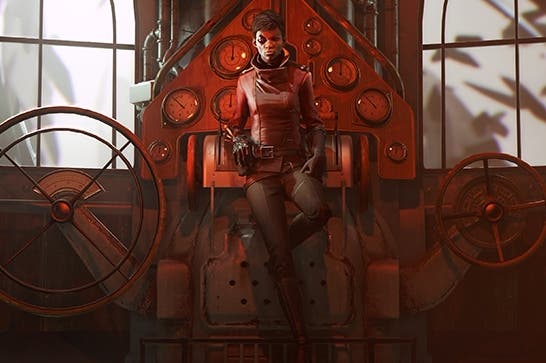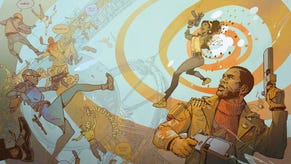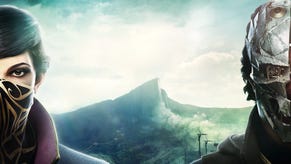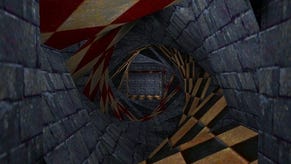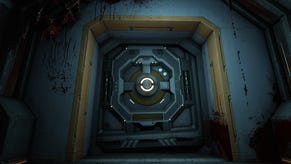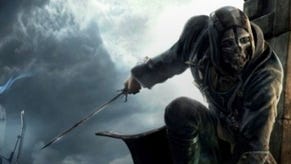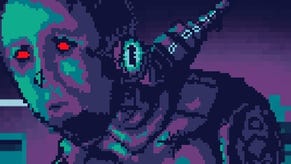The Death of the Outsider is far from the end for Arkane Studios
"I wish there were rules, then everyone would be rich."
The immersive sim has seen a kind of mini-renaissance in the past couple of years. Prey, Deus Ex, and of course Dishonored 2 stand out as games that recently arrived to varying, but all positive, degrees of critical acclaim. But that critical reception was conclusively unmatched by sales - so much so that it is now very easy to draw less-than-optimistic conclusions about the future of the entire genre itself, and indeed the series within.
But we are getting more Dishonored, anyway - at least for now we are - in the form of Death of the Outsider, a significant, full-fat expandalone that I spent some time with at Gamescom.
At this point I would normally say something about how Death of the Outsider is more of the same - it is - but I feel that might not do it justice. It's only more of the same insofar as more of the same is just what we want from it; Dishonored 2 was excellent, a sort of sickeningly beautiful construction built for the ingenious mass-murderer in all of us. Edwin, who reviewed the game, called it a "masterpiece of open-ended design." Death of the Outsider, from what I played, seems like about ten to twelve more hours of exactly that.
There are a few tweaks here and there from the master tinkerers behind it. There's no more reliance on elixirs to power your abilities, for example, which admittedly sounds like a huge change, but is still gated by a system of slowly regenerating ability-fuel. Billie Lurk - they should be in prison for that name - the only playable character, hasn't been touched by the Outsider in the same way as Emily or Corvo had previously, and thus it's merely her own energy that's keeping things in check.
It's a gentle, effective re-tuning, a hard stop followed by conscious refueling transformed into unlimited ability usage, gated by what is, in essence, just a cooldown and the passage of time. Still, as well as playing Death of the Outsider out at Gamescom I also spoke to Dinga Bakaba and Christophe Carrier, lead designer and lead level designer respectively on Dishonored 2 and Death of the Outsider, and being the men behind of some of recent gaming's finest level design they had some predictably intelligent things to say about it.
"Everything is linked together, right?" Carrier says, "the way you play Billie is not the way you play Emily or Corvo, it's faster when you play Billie, because you don't have the limitation of the mana, you try things, you combine things, so it's a different way - it's a different character and a different way to play it." If Dishonored or Dishonored 2 were to have that same potion-free system, he continues, "the exploration would be less interesting because you would have fewer things to find. Each game has its own identity."
I do worry, though, that regardless of the clever ways your abilities are paced, or the genius intricacies of the level design, I'm just not actually good enough to play Death of the Outsider the way it's intended. The recharging energy bar does give me a few more stabs at a trick before failing to land it becomes fatal, but I didn't personally play the game any faster, and there was no added slickness or rhythm to my time with it. The more tools I have the more I freeze, wanting to stop and read every tooltip, watch every tutorial, overthink every angle, before cocking it up in practice again anyway.
It's just the way I'm built, it's for any game that's similar, and I do wonder if that's a problem I'm not alone with. Immersive sims are intimidating, at least to some, and you could reasonably assume that to be a part of why they don't shift the copies of some of their more inviting peers.
For all their failure at making my own life easier in Dishonored - for which the fault lies entirely at my clumsy fingers - the shift to a more streamlined approach to abilities does seem like an appeal to the wider audience. Bakaba, for example, was keen to describe Dishonored, and even its peers, as "action games," over stealth or immersive sim. I wonder aloud to him and Carrier if that was part of a more conscious attempt to bring in new players, but in fact that seems of lesser importance to them than it just playing the way they want it to. "I don't think it's niche at all, I think it's a matter of continuing to move forward with our values," and likewise "it's not about complexity."
"It's more about some experimentations that we wanted to make, as game-makers first," Bakaba says. The same goes for the decision to go with the expandalone as a format. "One of the main things that triggered this discussion for me was actually The Old Blood for Wolfenstein - I was like man, that's a cool format, because they get one year to make this new campaign, and it's sizeable, and it has a different theme, and it allows you to visit a different area of the world... right now there are different ways to go at game development. Basically it's interesting to question yourself about things like that."
There is, I have come to realise, a surprising amount of freedom in the way Bakaba, Carrier, and Arkane in general are able to approach their work. Out here in the wild it looks, quite frankly, like their genre of specialty is dying, and a mega-publisher like Bethesda, with its giant Fallout and Elder Scrolls franchises - and infamous crushing of the original Prey sequel - does not, on the surface, appear to be the most tolerant.
Bakaba though is stoically optimistic. "I know that everyone always says my publisher is cool to work with, but I'm not saying that to please anyone," he laughs, "I think it's a good fit between Bethesda and Arkane for that. I mean they acquired us to work with us because of what we do, and they value what we are in a way. I think that's really good. They've been very supportive. It's good to be in a position to be able to experiment."
Carrier agrees. "I've been playing games since Pong, that's how old I am. And I've seen the game industry change time after time. At some point people were saying, 'Oh single player games are dead' and for some time there were no single-player adventure games around, and then suddenly - bing! - another game, maybe like Dishonored, and everyone's like, 'Oh that's super cool!' So there are no rules - I wish there were rules, then everyone would be rich."
"We're doing what we love... I want to make games forever, I like it, this is something I really like! It's a passion, and I wouldn't make a game that I don't like. So that's my first and only reason for doing games, personally. If a game sells very well and if it's the type of game that appeals to a lot of people, I'm happy. If not, well, whatever."
"As designers if you start to think, 'let's do this because it's gonna work', well it's not gonna work. It doesn't mean that we have to stay locked into what we can do and what we know how to do. You have to be very open to games, I'm playing a lot of games still now - I have a family and I'm going to sleep at three in the night because I have to play a lot of games. I don't like it, but when you're passionate that's what you do, you love things and it has to have a huge place in your life... and that's why I think Arkane managed to do that for so long, because that's what we are, basically."
"I want to do something that I love. That's the point."
